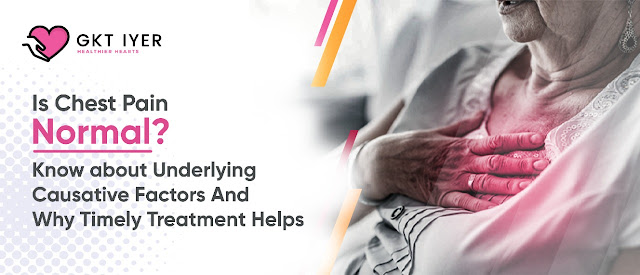Is Chest Pain Normal? Know about Underlying Causative Factors and Why Timely Treatment Helps
The thought of chest pain is scary, and if someone ever mentions it while clutching onto the left side of their upper body, it can trigger an instant cause of concern. Even a minimal amount of dull or sharp pain in the upper front of your body, above the stomach, can lead you to think about an impending heart attack.
While it may be Contrary to popular belief, not all chest
pains indicate a heart attack or cardiac arrest. These events can occur for
various reasons, so it is important not to take any chest pain lightly and to
seek medical attention immediately.
Types of Chest Pain:
Gastrointestinal Chest Pain:
Acid reflux is one of the most common causes of chronic
chest pain. It is often caused by eating large meals or lying down after
consuming food. Other factors that can cause this pain are structural and
functional problems in the esophagus, such as hypersensitivity, perforation, or
rupture. Additionally, gallstones in the gallbladder or hiatal hernia can also
cause chronic chest pain.
If you're experiencing chest pain on a regular basis and
your doctor has ruled out any heart-related issues, it might be time to take a
closer look at your eating habits or see a gastroenterologist for an accurate
diagnosis.
However, not all gastrointestinal issues can be treated with
medication and lifestyle changes. If the pain persists, you may need to get
tested for anomalies related to the gallbladder, pancreas, and colon. These
health conditions may require urgent surgical intervention.
Heart-Related Pain in the Chest:
If you're experiencing a squeezing pain in your upper body
towards the left, accompanied by difficulty breathing and sweating, it's most
likely a heart-related problem.
Pain in the left arm could be a heart attack or myocardial
infarction caused by blocked arteries restricting blood flow to the heart.
Other reasons for this intense pain include:
·
Myocarditis or the inflammation of the heart
muscle
·
Pericarditis or the lump of the sac around the
heart
·
Aortic dissection is a rare condition that
involves a tear in the inner layer of the main artery, aorta.
·
Cardiomyopathy, a disease of the heart muscle
Respiratory Reasons:
Symptoms of weaker lungs often mirror heart-related ailments
and require immediate attention. The lungs are a vital organ located close to
the heart in the upper cavity of the human body - even a minor disruption can
leave one gasping for breath and in intense pain.
There are a number of lung conditions that can cause trouble
breathing, severe muscle pain, and sudden chest pain, including pneumonia, viral
bronchitis, bronchospasm, or tightness in the chest region in patients with
asthma or Chronic Obstructive Pulmonary Disease (COPD). If you are experiencing
any of these symptoms, it is important to seek medical attention as soon as
possible.
In emergency situations like pulmonary embolism, or when a
patient has a blood clot and is suffering from pulmonary edema, they will need
highly advanced medical care - otherwise, it could be fatal. Chest pain is a
common symptom for patients who have lung cancer, and are undergoing
chemotherapy or other cancer treatments.
Pneumothorax, another respiratory illness, happens when a
section of the lung collapses and air enters the chest cavity. This causes
immense pain every time the patient tries to inhale and lowers blood pressure.
Other Reasons for Chest Pain:
There are a few possible explanations for why someone would
experience severe pain in the left side of their chest. It could be something
as simple as fractured ribs or a sprain/torn muscle from an accident.
Regardless of the cause, it's always best to consult with a medical
professional to get a correct diagnosis and rule out any serious possibilities.
Costochondritis, which is the inflammation of the cartilage
where the ribs meet the breastbone, can cause intense pain.
Patients with lung cancer often experience episodes of pain
in the chest region.
Panic and anxiety attacks are more common than ever before
and often have similar symptoms to a heart attack.
Diagnosis of the Chest Pain:
Severe chest pain is a medical emergency that requires
prompt treatment. Your doctor will likely order several diagnostic tests to
determine the underlying cause of your chest pain. In the case of heart-related
problems, an electrocardiogram (ECG) can help diagnose a heart attack. This
test is often paired with blood work to measure enzyme levels. If a heart
attack is diagnosed, treatment may involve angiography to clear blocked
arteries or other minimally invasive surgical procedures. With prompt and
appropriate treatment, most people make a full recovery.
If you're experiencing any lung-related issues, it's
important to get imaging tests like a chest x-ray, MRI, and CT-Scan has done as
soon as possible so that an accurate diagnosis can be made. Blood tests may
also be required. If not addressed in a timely manner, gastrointestinal issues
can lead to various other complications. For emergency medical care, reach out
to your nearest hospital. For more information on precise diagnosis and
treatment for chest pain, contact Dr. Ganesh Krishnan Iyer - the best Cardiothoracic
Surgeon in Bangalore.


Comments
Post a Comment